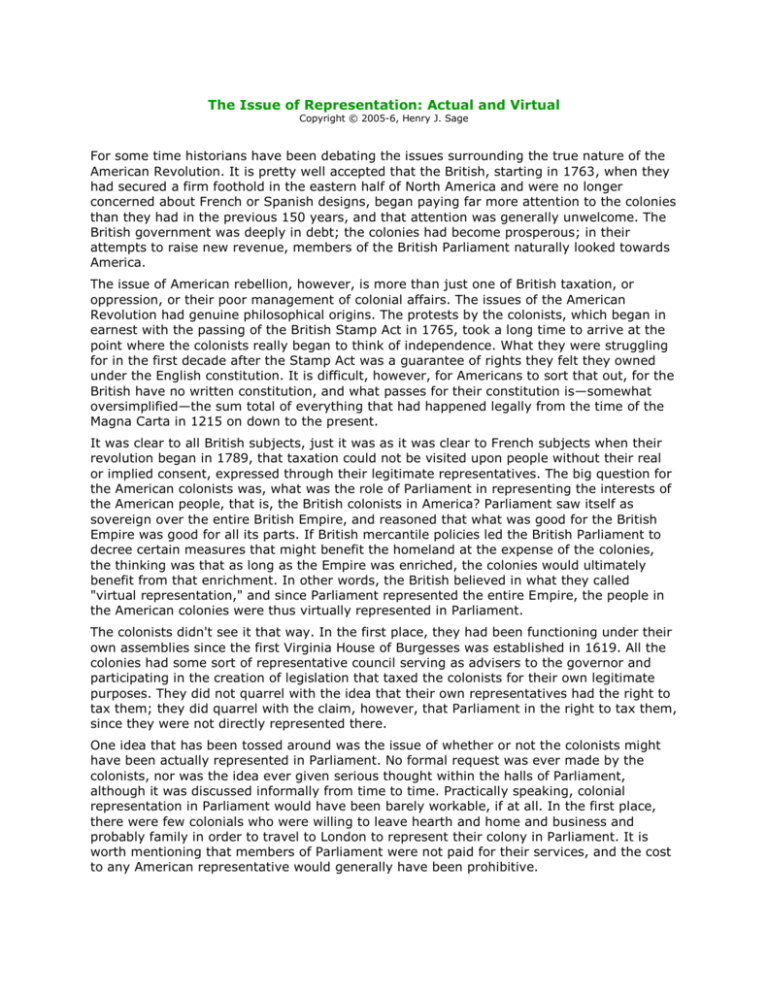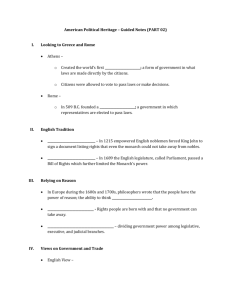Click
advertisement

The Issue of Representation: Actual and Virtual Copyright © 2005-6, Henry J. Sage For some time historians have been debating the issues surrounding the true nature of the American Revolution. It is pretty well accepted that the British, starting in 1763, when they had secured a firm foothold in the eastern half of North America and were no longer concerned about French or Spanish designs, began paying far more attention to the colonies than they had in the previous 150 years, and that attention was generally unwelcome. The British government was deeply in debt; the colonies had become prosperous; in their attempts to raise new revenue, members of the British Parliament naturally looked towards America. The issue of American rebellion, however, is more than just one of British taxation, or oppression, or their poor management of colonial affairs. The issues of the American Revolution had genuine philosophical origins. The protests by the colonists, which began in earnest with the passing of the British Stamp Act in 1765, took a long time to arrive at the point where the colonists really began to think of independence. What they were struggling for in the first decade after the Stamp Act was a guarantee of rights they felt they owned under the English constitution. It is difficult, however, for Americans to sort that out, for the British have no written constitution, and what passes for their constitution is—somewhat oversimplified—the sum total of everything that had happened legally from the time of the Magna Carta in 1215 on down to the present. It was clear to all British subjects, just it was as it was clear to French subjects when their revolution began in 1789, that taxation could not be visited upon people without their real or implied consent, expressed through their legitimate representatives. The big question for the American colonists was, what was the role of Parliament in representing the interests of the American people, that is, the British colonists in America? Parliament saw itself as sovereign over the entire British Empire, and reasoned that what was good for the British Empire was good for all its parts. If British mercantile policies led the British Parliament to decree certain measures that might benefit the homeland at the expense of the colonies, the thinking was that as long as the Empire was enriched, the colonies would ultimately benefit from that enrichment. In other words, the British believed in what they called "virtual representation," and since Parliament represented the entire Empire, the people in the American colonies were thus virtually represented in Parliament. The colonists didn't see it that way. In the first place, they had been functioning under their own assemblies since the first Virginia House of Burgesses was established in 1619. All the colonies had some sort of representative council serving as advisers to the governor and participating in the creation of legislation that taxed the colonists for their own legitimate purposes. They did not quarrel with the idea that their own representatives had the right to tax them; they did quarrel with the claim, however, that Parliament in the right to tax them, since they were not directly represented there. One idea that has been tossed around was the issue of whether or not the colonists might have been actually represented in Parliament. No formal request was ever made by the colonists, nor was the idea ever given serious thought within the halls of Parliament, although it was discussed informally from time to time. Practically speaking, colonial representation in Parliament would have been barely workable, if at all. In the first place, there were few colonials who were willing to leave hearth and home and business and probably family in order to travel to London to represent their colony in Parliament. It is worth mentioning that members of Parliament were not paid for their services, and the cost to any American representative would generally have been prohibitive. And once being seated in parliament, how well would a colonial representative be able to represent the will of the colonists at home? And what would the size and shape of that representation be? Assuming that each colony would be given one representative, with perhaps one or two extra members for the large cities such as Philadelphia, New York or Boston, they might have expected to have at most 15 to 20 representatives in Parliament. Since the total membership in Parliament numbered over 600, it is unlikely that those colonial representatives could have exerted sufficient pressure on the rest of the members to protect the interests of the colonies themselves. So it is not surprising that the issue of representation in Parliament was never seriously addressed, as it probably wouldn't have worked even if attempted. That left the colonists faced with the question of who their proper representatives were, and it is clear from the resolutions passed by the various Congresses and in correspondence exchanged among the colonials themselves that they felt their only legitimate representatives to be those of their own colonial assemblies. Parliament might govern the affairs of the Empire, including colonial trade, and the colonists had no difficulty with navigation laws; in terms of any kind of direct taxation, however, what they would have called internal taxation, Parliament, as they saw it, had no authority over them. Much of the background of the revolution was thus philosophical, but another part of it was eminently practical. For virtually all of colonial existence, the crown had scarcely paid any attention to the colonies whatsoever. Certainly there were navigation acts and mercantile laws that taxed the trade of the colonies, but those laws had been virtually impossible to enforce, and the colonists had become very good in avoiding them in any case. (At the time of the revolution, in fact, John Hancock, first signer of the Declaration of Independence, had a large number of warrants out for his arrest for smuggling.) So even if the colonists had accepted the idea of parliamentary taxation, practically speaking it would have been something that they were not used to, and adjusting to it would have taxed their patience to the limit. The result was that the colonists were not about to accept British concepts of “virtual” representation; they believed that only by their own legitimate representatives could they be taxed at all. Since the British stubbornly refused to knowledge that the colonists possessed their own legitimate rights, some sort of clash was inevitable. If the British had handled affairs with more skill, tact, and diplomacy, perhaps the issues could have been worked out a friendly manner; but the British Parliament exercised little of that. Instead they insisted upon forcing new legislation on the colonies, persisted in assessing them with new duties, and finally, after the Boston tea party, passing a series of what the colonists called "Intolerable Acts," which finally forced the colonists to the realization that they were going to have to fight for their rights. It did not take very long after the fighting started for the colonists to come to the realization that simply to fight to keep things the way they had been before was not going to guarantee that they would not continue to be harassed in the future. So they eventually, and more or less inevitably, arrived at the goal of independence, which will be a topic for further discussion. Directions: Answer the following questions on a separate sheet of paper after reading and analyzing The Issue of Representation: Actual and Virtual. 1. What is meant by “the American Revolution had genuine philosophical origins?” 2. Why was it difficult for colonists to determine their rights? 3. Explain “virtual representation.” How did the British Parliament apply this concept? 4. How does the use of their own legislatures (like the House of Burgesses) create evidence to explain that the colonists truly had a quarrel with the virtual representation process and not just the taxes themselves? 5. While independence may not have been the original goal, why did colonists realize they have to break away from England (summarize the article)? Use the back if necessary.






